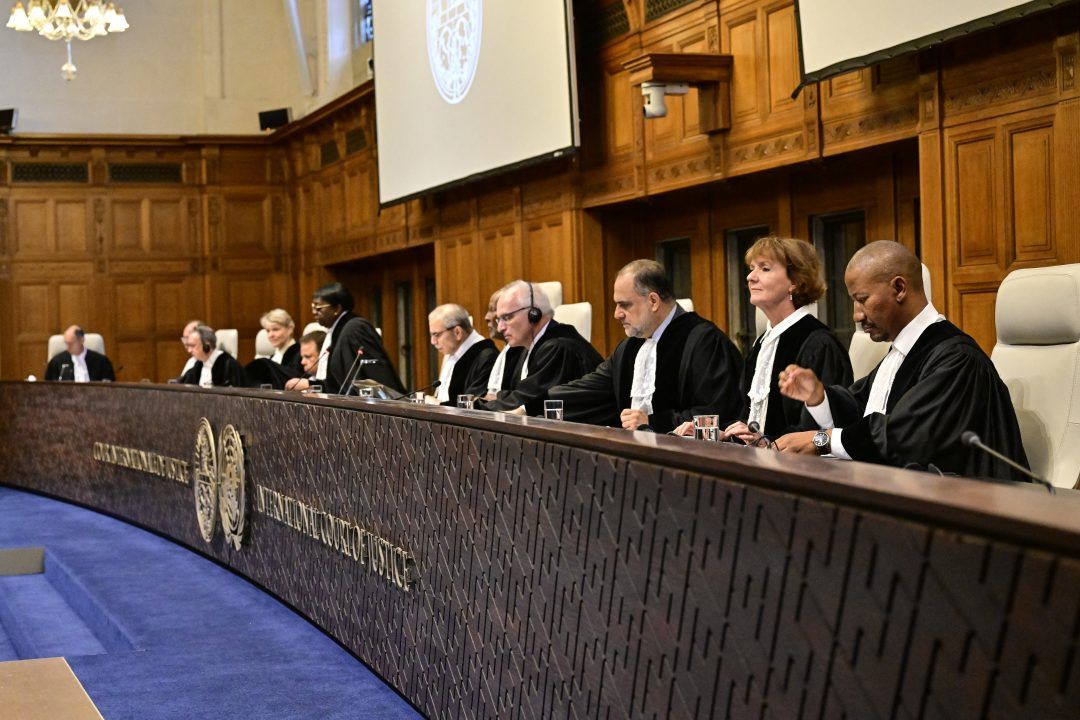- Home
- War in the Middle East
- ICJ Orders Israel to Halt Rafah Offensive and Open Aid Crossings

©Nick Gammon / AFP
The International Court of Justice (ICJ), top United Nations court, ordered on Friday Israel to halt military operations in Rafah, a landmark ruling likely to increase mounting international pressure on Israel more than seven months into the Gaza war.
ICJ rulings are legally binding, but the court has no concrete means to enforce them.
Israel must "immediately halt its military offensive, and any other action in the Rafah Governorate, which may inflict on the Palestinians in Gaza conditions of life that could bring about its physical destruction in whole or in part," the court said.
It also ordered Israel to keep open the Rafah crossing into Gaza for the "unhindered" provision of humanitarian aid and urged the "unconditional" release of hostages taken by Hamas during its October 7 assault.
The ICJ ruling comes hot on the heels of another highly charged decision Monday by the International Criminal Court prosecutor, Karim Khan, to seek arrest warrants for top Israeli and Hamas leaders.
South Africa brought the case before the ICJ last year alleging that Israel's Gaza offensive breached the 1948 UN Genocide Convention – a charge strongly denied by Israel.
In a ruling on January 26 that made headlines worldwide, the ICJ ordered Israel to do everything it could to prevent acts of genocide during its military operation in Gaza.
The ICJ on Friday also ordered Israel to ensure "unimpeded access" to UN-mandated investigators to look into allegations of genocide.
In the meantime, South Africa has returned several times to the ICJ arguing that the dire humanitarian situation in Gaza compels the court to issue further fresh emergency measures.
The court did so in March, ordering new measures compelling Israel to ensure the "unhindered provision at scale" of humanitarian aid.
In public hearings last week, South Africa's ambassador Vusimuzi Madonsela alleged that "Israel's genocide has continued apace and has just reached a new and horrific stage."
South Africa argued that the only way to enable humanitarian aid to ease the crisis in Gaza was a full halt to Israel's military operations.
The court will take months, if not years, to rule on the broader South African genocide case; but it can order urgent measures while weighing its decision.
Israel retorted that South Africa's case was an "obscene exploitation of the most sacred convention" and the picture Pretoria painted for the court was "completely divorced from the facts and circumstances."
Israel also said it was "acutely aware" of the suffering of civilians in the Gaza Strip and that it has made "extensive efforts" to increase the flow of humanitarian aid.
Israel said Thursday it was ready to resume stalled talks on a hostage release deal with Hamas, as Netanyahu faces growing domestic pressure to secure their freedom.
United States intelligence chief Bill Burns is expected to meet Israeli representatives in Paris to relaunch negotiations.
Previous talks in Cairo and Doha, attended by Egypt and Qatar as mediators for Hamas, broke up earlier this month.
Richard Carter, with AFP
ICJ rulings are legally binding, but the court has no concrete means to enforce them.
Israel must "immediately halt its military offensive, and any other action in the Rafah Governorate, which may inflict on the Palestinians in Gaza conditions of life that could bring about its physical destruction in whole or in part," the court said.
It also ordered Israel to keep open the Rafah crossing into Gaza for the "unhindered" provision of humanitarian aid and urged the "unconditional" release of hostages taken by Hamas during its October 7 assault.
The ICJ ruling comes hot on the heels of another highly charged decision Monday by the International Criminal Court prosecutor, Karim Khan, to seek arrest warrants for top Israeli and Hamas leaders.
'Obscene exploitation'
South Africa brought the case before the ICJ last year alleging that Israel's Gaza offensive breached the 1948 UN Genocide Convention – a charge strongly denied by Israel.
In a ruling on January 26 that made headlines worldwide, the ICJ ordered Israel to do everything it could to prevent acts of genocide during its military operation in Gaza.
The ICJ on Friday also ordered Israel to ensure "unimpeded access" to UN-mandated investigators to look into allegations of genocide.
In the meantime, South Africa has returned several times to the ICJ arguing that the dire humanitarian situation in Gaza compels the court to issue further fresh emergency measures.
The court did so in March, ordering new measures compelling Israel to ensure the "unhindered provision at scale" of humanitarian aid.
In public hearings last week, South Africa's ambassador Vusimuzi Madonsela alleged that "Israel's genocide has continued apace and has just reached a new and horrific stage."
South Africa argued that the only way to enable humanitarian aid to ease the crisis in Gaza was a full halt to Israel's military operations.
The court will take months, if not years, to rule on the broader South African genocide case; but it can order urgent measures while weighing its decision.
Israel retorted that South Africa's case was an "obscene exploitation of the most sacred convention" and the picture Pretoria painted for the court was "completely divorced from the facts and circumstances."
Israel also said it was "acutely aware" of the suffering of civilians in the Gaza Strip and that it has made "extensive efforts" to increase the flow of humanitarian aid.
Stalled talks
Israel said Thursday it was ready to resume stalled talks on a hostage release deal with Hamas, as Netanyahu faces growing domestic pressure to secure their freedom.
United States intelligence chief Bill Burns is expected to meet Israeli representatives in Paris to relaunch negotiations.
Previous talks in Cairo and Doha, attended by Egypt and Qatar as mediators for Hamas, broke up earlier this month.
Richard Carter, with AFP
Read more



Comments